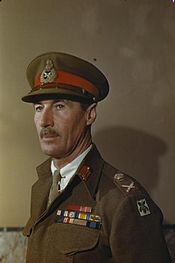Ronald Scobie
Sir Ronald Scobie | |
|---|---|
 | |
| Born | (1893-06-08)8 June 1893 Mandalay, British Burma[1] |
| Died | 23 February 1969(1969-02-23) (aged 75) Aldershot, Hampshire, England[1] |
| Allegiance | United Kingdom |
| Service/branch | British Army |
| Years of service | 1914–1947 |
| Rank | Lieutenant General |
| Unit | Royal Engineers |
| Commands held | III Corps 70th Infantry Division |
| Battles/wars | First World War Second World War Greek Civil War |
| Awards | Knight Commander of the Order of the British Empire Companion of the Order of the Bath Military Cross Mentioned in Despatches (4) War Cross (Czechoslovakia) Silver Cross of the Virtuti Militari (Poland) |
Lieutenant General Sir Ronald MacKenzie Scobie, KBE, CB, MC (8 June 1893 – 23 February 1969)[2] was a senior British Army officer who fought in both the First and Second World Wars, where he commanded the 70th Infantry Division and later III Corps.[3]
Contents
1 Early life and military career
2 Between the wars
3 Second World War
4 References
5 Bibliography
6 External links
Early life and military career
Educated at Cheltenham College and the Royal Military Academy, Woolwich, Scobie played rugby for Scotland in 1914. He was commissioned into the Royal Engineers in 1914 and served during the First World War on the Western Front in France and Belgium. He was a General Staff Officer Grade 3 in France in 1918, and a Brigade Major in France from 1918 to 1920.
Between the wars
After the war, Scobie became Officer, Company of Gentlemen Cadets, Royal Marine Artillery, Woolwich 1920–1924; Staff Captain, Aldershot Command 1927–1929; Brigade Major, Aldershot Command 1929–1931[4] After attending the Staff College, Camberley from 1925 to 1926, he became Director of Military Artillery at the Royal Military College, Duntroon in 1932 and, after attending the Imperial Defence College, was Assistant Adjutant General at the War Office in 1938.[4]
Second World War
In 1939, at the outbreak of the Second World War Scobie, a brigadier, was Deputy Director of Mobilisation at the War Office.[4] After this he held the position Deputy Adjutant General at General Headquarters, Middle East Land Forces in 1940 before being given command of the 70th Infantry Division,[4] which was sent in to relieve the Australian 9th Division in Tobruk. Scobie was in command of the Tobruk fortress from 22 October 1941 to 13 December 1941, when, as part of Operation Crusader, the 70th Infantry Division led the break-out from Tobruk. In 1942 he became General Officer Commanding the Troops in Malta and on 22 March 1943 Scobie was promoted to lieutenant general and made Chief of the General Staff at General Headquarters Middle East.[4] From 11 December 1943 he was given command of III Corps[5] which was sent to Greece to expel the Germans but ended up becoming involved in the Greek Civil War. He remained in command of British forces in Greece until 1946, retiring from the army in 1947.
References
^ ab Ronald Scobie at CricketArchive (subscription required)
^ The Royal Engineers Journal. 83. The Institution of Royal Engineers. 1969. p. 152..mw-parser-output cite.citation{font-style:inherit}.mw-parser-output .citation q{quotes:"""""""'""'"}.mw-parser-output .citation .cs1-lock-free a{background:url("//upload.wikimedia.org/wikipedia/commons/thumb/6/65/Lock-green.svg/9px-Lock-green.svg.png")no-repeat;background-position:right .1em center}.mw-parser-output .citation .cs1-lock-limited a,.mw-parser-output .citation .cs1-lock-registration a{background:url("//upload.wikimedia.org/wikipedia/commons/thumb/d/d6/Lock-gray-alt-2.svg/9px-Lock-gray-alt-2.svg.png")no-repeat;background-position:right .1em center}.mw-parser-output .citation .cs1-lock-subscription a{background:url("//upload.wikimedia.org/wikipedia/commons/thumb/a/aa/Lock-red-alt-2.svg/9px-Lock-red-alt-2.svg.png")no-repeat;background-position:right .1em center}.mw-parser-output .cs1-subscription,.mw-parser-output .cs1-registration{color:#555}.mw-parser-output .cs1-subscription span,.mw-parser-output .cs1-registration span{border-bottom:1px dotted;cursor:help}.mw-parser-output .cs1-ws-icon a{background:url("//upload.wikimedia.org/wikipedia/commons/thumb/4/4c/Wikisource-logo.svg/12px-Wikisource-logo.svg.png")no-repeat;background-position:right .1em center}.mw-parser-output code.cs1-code{color:inherit;background:inherit;border:inherit;padding:inherit}.mw-parser-output .cs1-hidden-error{display:none;font-size:100%}.mw-parser-output .cs1-visible-error{font-size:100%}.mw-parser-output .cs1-maint{display:none;color:#33aa33;margin-left:0.3em}.mw-parser-output .cs1-subscription,.mw-parser-output .cs1-registration,.mw-parser-output .cs1-format{font-size:95%}.mw-parser-output .cs1-kern-left,.mw-parser-output .cs1-kern-wl-left{padding-left:0.2em}.mw-parser-output .cs1-kern-right,.mw-parser-output .cs1-kern-wl-right{padding-right:0.2em}
^ "British Army officer histories". Unit Histories. Retrieved 2017-06-23.
^ abcde Liddell Hart Centre for Military Archives
^ "Ronald Scobie". Orders of Battle.com.
Bibliography
Mead, Richard (2007). Churchill's Lions: a biographical guide to the key British generals of World War II. Stroud (UK): Spellmount. ISBN 978-1-86227-431-0.
Smart, Nick (2005). Biographical Dictionary of British Generals of the Second World War. Barnesley: Pen & Sword. ISBN 1844150496.
External links
| Wikimedia Commons has media related to Ronald Scobie. |
- WWII Peoples War: Force 140
- British Army Officers 1939–1945
- Generals of World War II
| Military offices | ||
|---|---|---|
New command | GOC 70th Infantry Division 1941–1942 | Succeeded by George Symes |
| Preceded by Desmond Anderson | GOC III Corps 1943–1944 | Post disbanded |
